For the 2025 school year, there is 1 public preschool serving 244 students in Gwinn Area Community Schools School District. This district's average pre testing ranking is 3/10, which is in the bottom 50% of public pre schools in Michigan.
Public Preschool in Gwinn Area Community School School District have an average math proficiency score of 17% (versus the Michigan public pre school average of 32%), and reading proficiency score of 27% (versus the 40% statewide average).
Minority enrollment is 24% of the student body (majority Hispanic), which is less than the Michigan public preschool average of 39% (majority Black).
Overview
This School District
This State (MI)
# Schools
3 Schools
1,089 Schools
# Students
967 Students
372,198 Students
# Teachers
64 Teachers
24,811 Teachers
Student : Teacher Ratio
15:1
15:1
District Rank
Gwinn Area Community Schools School District, which is ranked within the bottom 50% of all 851 school districts in Michigan (based off of combined math and reading proficiency testing data) for the 2021-2022 school year.
The school district's graduation rate of 70-79% has decreased from 75-79% over five school years.
Overall District Rank
#642 out of 866 school districts
(Bottom 50%)
(Bottom 50%)
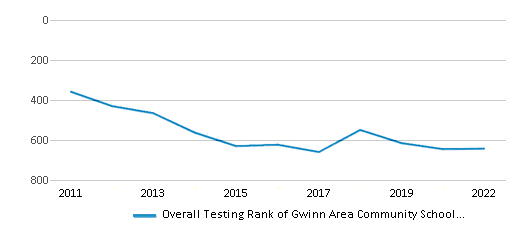
Math Test Scores (% Proficient)
18%
34%
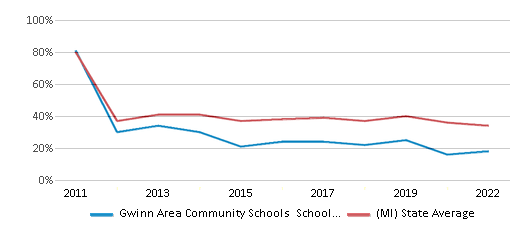
Reading/Language Arts Test Scores (% Proficient)
29%
45%
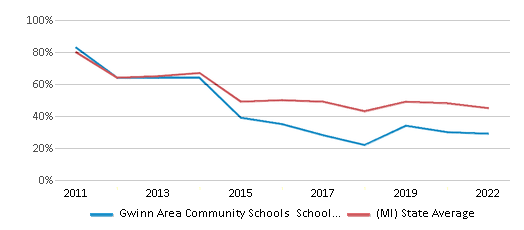
Science Test Scores (% Proficient)
27%
38%
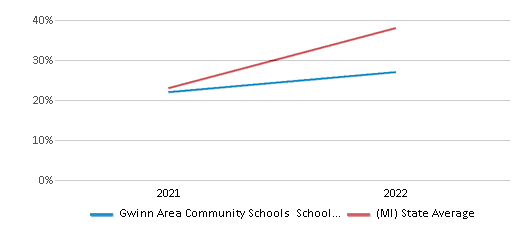
Graduation Rate
70-79%
81%
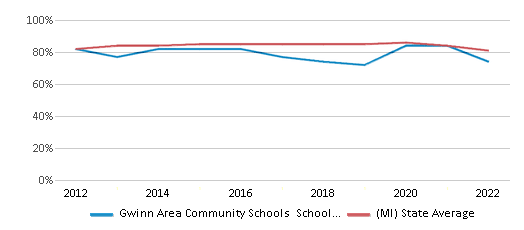
Students by Ethnicity:
Diversity Score
0.33
0.58
# American Indian Students
16 Students
2,804 Students
% American Indian Students
2%
1%
# Asian Students
4 Students
11,161 Students
% Asian Students
n/a
3%
# Hispanic Students
47 Students
33,151 Students
% Hispanic Students
5%
9%
# Black Students
14 Students
79,200 Students
% Black Students
2%
21%
# White Students
785 Students
225,969 Students
% White Students
81%
61%
# Hawaiian Students
n/a
334 Students
% Hawaiian Students
n/a
n/a
# Two or more races Students
101 Students
19,240 Students
% of Two or more races Students
10%
5%
Students by Grade:
# Students in PK Grade:
-
-
# Students in K Grade:
82
69,777
# Students in 1st Grade:
76
60,475
# Students in 2nd Grade:
76
57,993
# Students in 3rd Grade:
73
50,568
# Students in 4th Grade:
73
49,172
# Students in 5th Grade:
82
42,380
# Students in 6th Grade:
88
13,776
# Students in 7th Grade:
81
8,200
# Students in 8th Grade:
87
7,855
# Students in 9th Grade:
74
2,836
# Students in 10th Grade:
58
2,672
# Students in 11th Grade:
67
2,566
# Students in 12th Grade:
50
2,595
# Ungraded Students:
-
1,333
District Revenue and Spending
The revenue/student of $15,668 in this school district is less than the state median of $18,510. The school district revenue/student has stayed relatively flat over four school years.
The school district's spending/student of $13,592 is less than the state median of $17,693. The school district spending/student has stayed relatively flat over four school years.
Total Revenue
$15 MM
$25,476 MM
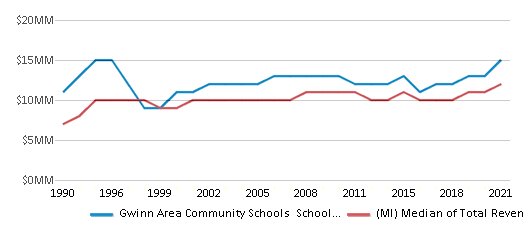
Spending
$13 MM
$24,351 MM
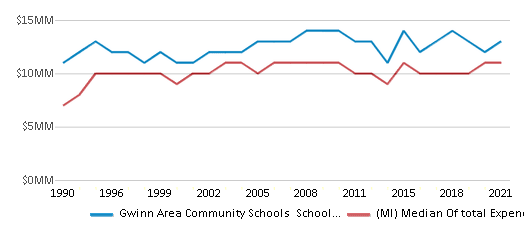
Revenue / Student
$15,668
$18,510
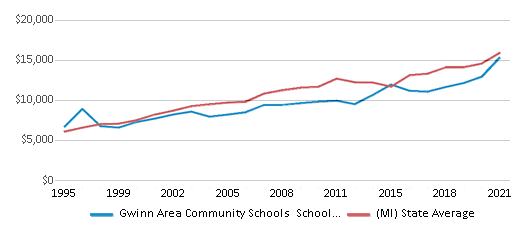
Spending / Student
$13,592
$17,693
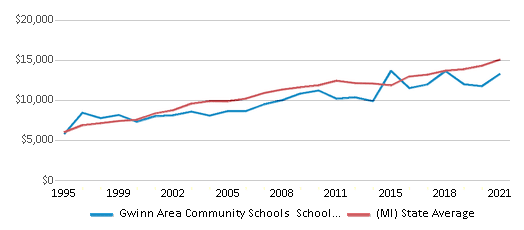
Best Gwinn Area Community Schools School District Public Preschools (2025)
School
(Math and Reading Proficiency)
(Math and Reading Proficiency)
Location
Grades
Students
Rank: #11.
Ki Sawyer Elementary School
(Math: 15-19% | Reading: 25-29%)
Rank:
Rank:
3/
Bottom 50%10
411 Scorpion Rd
Gwinn, MI 49841
(906) 346-5567
Gwinn, MI 49841
(906) 346-5567
Grades: PK-5
| 244 students
Recent Articles

What Is A Charter School?
Explore the world of charter schools in this comprehensive guide. Learn about their history, how they operate, and the pros and cons of this educational innovation. Discover key facts about charter schools, including admission policies, demographics, and funding, as well as what to look for when considering a charter school for your child.

10 Reasons Why High School Sports Benefit Students
Discover the 10 compelling reasons why high school sports are beneficial for students. This comprehensive article explores how athletics enhance academic performance, foster personal growth, and develop crucial life skills. From improved fitness and time management to leadership development and community representation, learn why participating in high school sports can be a game-changer for students' overall success and well-being.

February 05, 2025
Understanding the U.S. Department of Education: Structure, Impact, and EvolutionWe explore how the Department of Education shapes American education, from its cabinet-level leadership to its impact on millions of students, written for general audiences seeking clarity on this vital institution.





